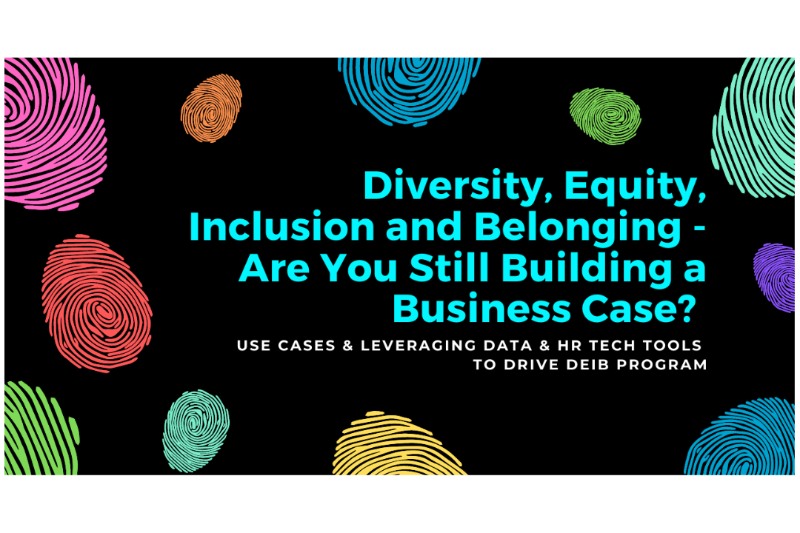Why Diversity, Equity, Inclusion and Belonging are Important? The business case of having a diverse & inclusive workforce has been established by umpteen research, but organizations are still finding themselves at the crossroads for leveraging tech.
by Swechha Mohapatra, Head Consulting and Delivery-Digital HR, hrtech

The need and importance of Diversity, Equity, Inclusion & Belonging (DEIB) within business and talent strategies has never been stronger. A number of factors, together, have amplified the importance of DEIB at workplace -
- Increasingly diverse multigenerational workforce
- Globalization - making the world of work smaller
- Rise of Digital HR technology
- Resurgence of racial and political protests
- Global health and economic crisis post-Covid
Workforce diversity, equity, inclusion, and belonging are not necessarily synonymous but when brought together, they help organizations realize the true benefits.
While Diversity is a fact (actual data and numbers), Inclusion is a choice (which includes inviting diverse groups to take part in decision making) and Belonging is the feeling that helps everyone feel accepted and bring their authentic self to work. In a diverse workplace, differences exist, and people require support in different ways. Equity asks us to acknowledge that everyone has different needs, experiences, and opportunities.
That’s where Verna Myers quote helps clear the mist, “Diversity is being invited to the party; Inclusion is being asked to dance.” Furthering the analogy Jeff Hutchinson adds ” Equity is having an accessibility ramp to the door and Belonging is deciding the music for the party.”
Establishing the Business Case for DEI Technology
Whilst the business case of having a diverse & inclusive workforce — to report higher profits, be more innovative, have more engaged and empowered workforce — has far beyond been established by umpteen research from renowned firms such as McKinsey, Gallup, Gartner, Glassdoor, Deloitte, and Boston Consulting Group (BCG), organisations are still finding themselves at crossroads on how to leverage technology to reap the benefits of a diverse & inclusive workforce.
Many organisations are consciously making efforts to devise tech-driven strategies to promote DEIB at their workplace, not just in Singapore but across continents.
Benefits of Diverse and Inclusive Workforce
When DEIB strategies are included in business processes, they eventually translate into more productivity, positive work culture and profitable business outcomes. Organizations with inclusive work culture enjoy tangible and many intangible benefits as they are -
- 8x more likely to have overall better business outcomes
- 6x more likely to be innovative
- 6x more likely to be agile
- 3x more likely to be high performing
- 2x more likely to meet or exceed financial targets.
Diversity and Inclusion Functional Support Areas
To support organizations in a holistic strategy for bolstering diversity and inclusion efforts across the talent lifecycle, the HR Technology market offers solutions with a range of capabilities to enable HR teams in their D&I strategy.
Deloitte “Diversity and Inclusion Solutions” market landscape categorizes the available solutions in 6 HR functional areas that include human capital management suites that offer—
- Talent Acquisition solutions
- People Analytics solutions
- Talent Management suites
- Workforce Experience & Engagement solutions
- Pure-play Diversity and Inclusion solutions
- Rewards and Recognition solutions
Technology's Role in Diversity and Inclusion Support across the talent Lifecycle.
Fig.1 – D&I solutions across Talent Lifecycle, Source: Bersin, Deloitte Consulting
DEIB Solutions – HRTech Market Landscape
The 2021 study published by Josh Bersin on diversity, equity and inclusion (DEI) programs in business shows that after billions of dollars being invested in DEI training, tools, tech, and HR strategies, the needle hasn’t moved very far.
As organizations make D&I efforts a priority, they are turning to technology to build in practices, behaviors, insights, and recommendations that address bias by providing insights into their talent.
The HRTech & DEIB market is flooded with solutions that support these efforts by leaders across the talent lifecycle — which includes increasing objectivity in hiring decisions; check biases in performance evaluations, and better understand employee experiences and workforce composition.
Innovative DEIB Tools use cutting edge technology such as artificial intelligence (AI), deep machine learning, natural language processing (NLP), and organizational network analysis (ONA)––to help leaders manage DEIB agenda effectively. The DEIB tools are increasingly becoming more accepted as essential tools for people practices.
According to the latest study published by Redthread Research, the DEIB tech global market size is estimated to be $313 million and growing, up from $100 million in 2019 with a 136% increase (from 2019) in the number of HR tech vendors offering features or functionalities as part of solution offering.
DEIB Technology Landscape
In their 2021 report on DEIB Tools, Redthread research noted that the total number of DEIB tech vendors increased by 87%, with a total of 196 vendors in the market for 2021, compared with 105 in 2019.
The DEIB research and interactive tool lists the various solutions offered by vendors across four overarching categories and 21 subcategories :
- Acquire: Includes candidate sourcing (accessing and searching diverse candidate pools, changing job descriptions to reduce bias) and selection (delivering “blind” resumes, creating blind assessments, matching candidates to job descriptions, reducing biases during the selection process, and reducing bias during background checks).
- Advance/Develop: This category of tools include -
- Learning and Development (communication channels and post-event support for classroom training, Virtual reality training modules, AI and chatbots for microlearning)Mentorship and Career Management (enabling diverse talent to search for mentors or organically find mentors via networking, personalized career paths)
- Performance management (finding bias in performance feedback language, flagging potential bias in performance scores or rewards)
- High-potential selection (9 box analysis, hidden HIPO’s, flagging low representation in HIPOs)
- Leadership development (enable training for leaders, providing insights on leaders behaviors).
- Engage/Retain: This category of tools include employee experience, employee communications (analyzing team communications for impact on culture, feedback on written communication), and employee voice (like anonymous reporting, aiding innovation, and feedback).
- Analyze: This category of tools include D&I analysis (e.g., D&I dashboards and pay equity),D&I business case analysis (e.g., data that shows the return on diversity and inclusion investments), and employee resource group (ERG) management and analysis.
Putting it in Action: How are Organisations Leveraging Technology for their DEIB efforts?
The 2021 study “Elevating Equity and Diversity: The challenge of the Decade” by Josh Bersin, lists five essential strategies:
- Listen & Act
- Strengthen HR Capabilities in all Roles
- Engage Senior Leadership Commitment
- Set Goals and Measure and
- Create accountability for results.
The reports also list fifteen ancillary practices across the 5 essential factors that have the greatest impact on business, organizational, and workforce outcomes.
Some featured case studies in the report of Organisations who are actively making efforts across the above-mentioned practices include:
- Goldman Sachs uses the “rule of two” to drive diversity into hiring. The goal is to have two diverse and qualified candidates interview for each open role wherever possible, and hiring managers are accountable for interviewing a diverse slate of candidates.
- Deutsche Telekom uses diversity scouts to drive bias out of hiring decisions.
- Chevron uses diversity committees to review all pay, promotion, and career decisions and take the power out of the hands of a single manager.
- Qantas now uses a pre-screening tool by Predictive Hire that walks candidates through a number of questions via text message and ranks all candidates – often up to 1,000 for a single position – based on their fit for the job spent $11.7 billion with diverse suppliers in 2019, up from just $2M in 1994.
HRTech Vendors in Singapore offering DEI Solutions – Resources, Use Cases, and Case Studies
- Darwinbox: Handling recruitment bias through solutions like Blind CV’s for masking social-cultural information, Advanced solutions use AI to rank CVs, Addressing performance bias through continuous feedback, performance journals, immediate check-ins 360-degree feedback.
- RChilli: How HR Can Help Solve the Hiring Discrimination Crisis on a Budget - Localize Programmed Recruiting System to Address Hiring Discrimination Concerns, Assess testing Procedure of Recruitment Software, Acknowledge Data Attributes to Reduce Biases.
- The Talent Games: Hiring diverse candidates through HR Technology by using gamification in diversity recruiting, helping talent acquisition managers reach diverse, high-quality individuals.
- Phenom People: Time to Embrace Ideological Diversity and AI Can Help.
- Panalyt: Accelerate The Advancement of Diverse Talent With People Analytics & Organizational Network Analysis.
- Trustsphere: Measuring inclusion to drive diversity.
- Diversio: AI Meets D&I: How Diversio Is Redefining the Diversity Gold Standard
- Visier: How to Hire More Diverse Talent Using Workforce Analytics.
- Qualtrics: How to apply DEI to your employee experience program.
- Glint: How Employee Engagement Can Foster Workplace Inclusion, DIB’s Playbook.
- Textio: 6 practical diversity and inclusion activities you can start today.
- CultureAmp: 7 ways to get exec buy-in for diversity and inclusion work.
What Next: Where do we go from here?
There is no silver bullet, or a one-size-fits-all formula.
As organisations in Singapore and across the world realise the importance and benefits of a more diverse workforce and a more inclusive environment; the fast-growing HR technology market is catering to the growing demands by providing DEIB tools to help these organizations implement holistic diversity and inclusion strategy.
For a successful DEIB strategy, which aligns with the unique culture of the organisation, needs of the workforce, and the business environment, organisations need to listen to employees; have DEIB embedded in their HR programs with capable HR leaders providing meaningful consultation to actively drive DEIB initiatives & create a sustainable and cultural systemic change across the organisation.
It is important to note that the DEIB initiatives are not just HR initiatives; leadership engagement and accountability are critical for success and without it, any progress will be short-lived.
Even after the key components of diversity, equity inclusion, and belonging are put in place, it is imperative to set goals, benchmark against peers/industry, and communicate the metrics to keep everybody in the loop on the progress made & measure the business impact.
Particularly in DEIB efforts, technology alone will not change anything – as it has and will always be an enabler, not the enforcer. While organizations can undoubtedly leverage the plethora of ever-evolving technology to support diversity and inclusion across their workforce, evaluating their investments in HR technology across the talent lifecycle technology will be a critical component in the sustainable success of their DEIB strategy.
REFERENCES:
- 6 HR functional areas, Source: Deloitte Insights
- Diverse Leadership Teams, Source: BCG
- DEIB Tech 2021 , Redthread Research,
- Diversity & Inclusion Technology, Source: Mercer & Mettl
- Fig. 2 - The Five Essentials and Fifteen Practices that Matter Most. Source: DEI Research Report, Josh Bersinhttps://joshbersin.com/dei-research-report/
About the author :

Swechha Mohapatra (IHRP-CP, Associate CIPD) is Head Consulting and Delivery-Digital HR at hrtech.sg and has over 9 years of global experience in various Talent functions. She is a passionate HRTech evangelist, a member of IHRP HRTech CoP Taskforce, and an avid learner who is certified Six Sigma-Green Belt with a background of MBA (Specialization in HR and IT) and Master’s in Labor Laws and Labor Welfare.






